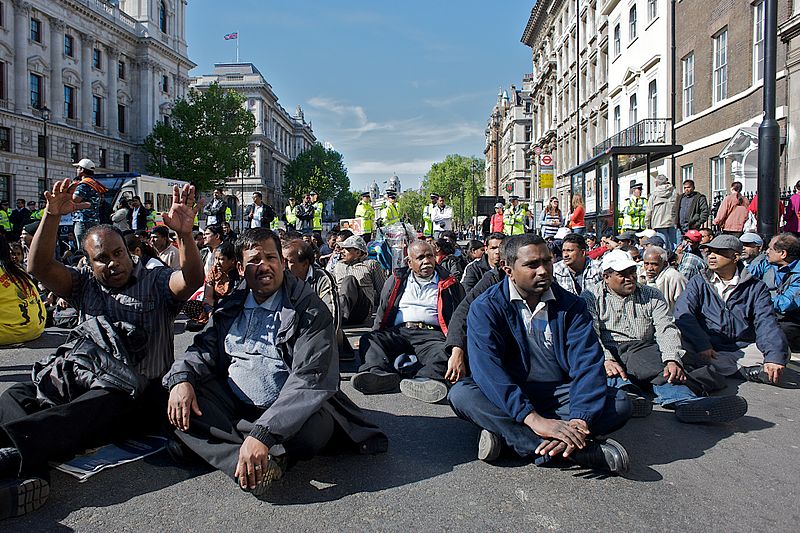LONDON (Parliament Politics Magazine): CRIME BILL- The government’s intentions to crack down on disrupting and boisterous protestors have been met with a succession of losses in the House of Lords.
Some of the provisions in the Police, Crime, Sentencing and Courts Bill were voted down by opposition peers, with Labour describing some of the plans as “outrageous.”
Yet another defeat came for the government when peers agreed to make misogyny a hate crime in Wales and England.
The bill will now return to the Commons for a vote by MPs.
Unless both Houses agree with the amendments, it cannot become a law, therefore the bill will now go back and forth between the Commons and the Lords until an agreement is achieved. The government will almost certainly continue to push for its initiatives.
The Police, Crime, Sentencing, and Courts Bill is a massive piece of legislation that contains important planned reforms to England and Wales’ criminal justice system.
The bill’s most controversial section concerns proposed modifications to protest laws, which the government suggested in reaction to environmental activists who have recently blocked roads, attached themselves to trains, and shut down printing presses.
The administration hoped to win Lords’ backing for its ideas, but the Lords repeatedly voted against them in a series of votes that lasted until the early hours of Tuesday morning.
261 votes to 166 was how the ministers lost in a vote on plans to give police additional powers to interrupt protests in England and Wales if they are considered excessively loud and disruptive.
Other ideas of making it illicit for protesters to attach themselves to things and give police officers the right of stopping and searching people in an effort to stop them from participating in illegal protests were also rejected by peers.
The government’s intentions, according to Green peer Baroness Jones, are “oppressive” and “plain nasty.”
She questioned ‘how did they genuinely expect a protest will proceed without noise.?’
Lord Hain of Labour’s, described the move as “the biggest threat to the right to dissent and the right to protest in my lifetime”, saying it would have “throttled” suffragettes’ protests.
Baroness Williams, the government’s Lords Home Office minister, backed the plans, telling peers that the powers would only be used by the police where they would be “necessary” and “appropriate.”
She asked her peers to explore the various scenarios in which a loud protest could occur.
Drums from a protest against the bill were audible in the Lords’ chamber throughout the debate, but the minister assured no one would try to interrupt it.
She said raucous anti-vaccination demonstrations outside a school or nursing home, on the other hand, were a different thing altogether, and that police should be able to intervene if required.
“A responsible government must defend the rights and freedoms of the law-abiding majority,” she said.
Their rights couldn’t and mustn’t be stomped on by a small group of demonstrators who feel they should not be held accountable before the law and should be allowed to cause as much disturbance as they want at whatever cost.
The government recently lost a vote in the House of Commons to make misogyny a hate crime in England and Wales, allowing judges to inflict harsher sentences if prejudice against women is proven to be the driving force.
Against the government’s intentions, the provision was inserted to the bill as an amendment that Conservative peer Baroness Newlove, a former victims’ commissioner, led.
According to Baroness Newlove, despite the fact that three million crimes against women were committed in only three years, the judicial and policing systems fail to acknowledge what all is known is self-evident: the deep-seated anti-woman animosity that underlies many of these crimes.
Steps, as a society, have been taken to recognise the seriousness of racist and homophobic crimes, but we have yet to act on crimes motivated by hatred of women have yet to be acted upon.
She argued, too often, society requires the perfect victim before anyone acts when it regards to violence against women and added that her amendment aimed to reverse the script.
The concept was opposed by Baroness Fox, who said that the data collected would be nearly based completely on subjective views of what constitutes misogyny.
She warned that if police resources were entangled in the reporting and monitoring of stats and data which she didn’t believe was reliable, they would be wasted.
Baroness Williams, cited a research from the Law Commission the previous year which determined that the problem of hostility towards women couldn’t be solved by making misogyny a hate crime.
Labour and the Liberal Democrats voted in favour of the amendment, which received 242 votes to 185 votes.





